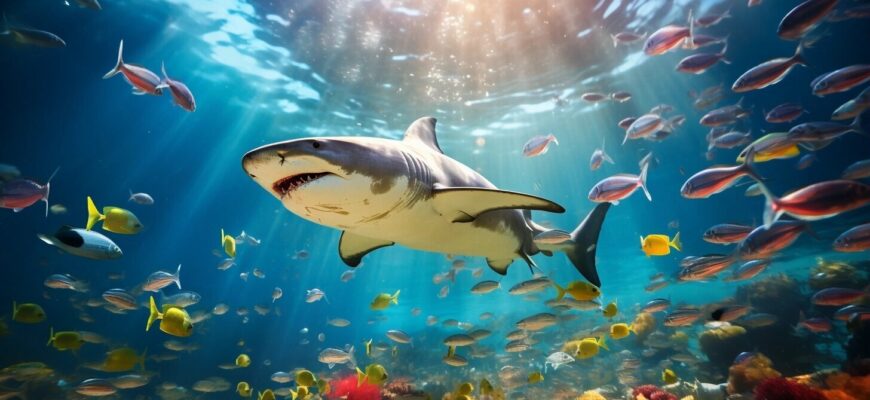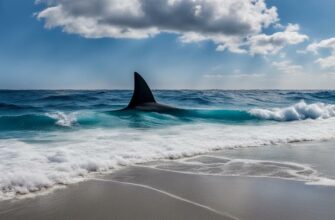Have you ever wondered if sharks eat jellyfish? It’s a common question that might seem straightforward, but the answer is not so simple. Sharks are known to consume a wide range of prey, including fish, crustaceans, and even other sharks. However, do they also eat jellyfish?
In this section, we will explore the topic of shark-jellyfish interaction and provide scientific insights to answer this question. Understanding the shark’s diet is crucial to comprehending their role in marine ecosystems and the potential impact on conservation efforts. So, let’s dive in and discover the surprising truth about whether sharks eat jellyfish.
- Shark Diets: What Do They Typically Eat?
- Shark Diets and Jellyfish
- Jellyfish: A Nutritional Analysis
- Shark Species and Jellyfish Consumption
- Hammerhead Sharks and Jellyfish Consumption
- Ecological Significance of Shark-Jellyfish Interaction
- The Importance of Sharks in Controlling Jellyfish Populations
- The Potential Consequences of a Disrupted Shark-Jellyfish Relationship
- The Need for Balance in the Ecosystem
- Shark Conservation and Jellyfish Consumption
- Frequently Asked Questions (FAQs) About Shark-Jellyfish Interaction
- Do all sharks eat jellyfish?
- Why do sharks eat jellyfish?
- Are jellyfish harmful to sharks?
- Can jellyfish populations affect shark populations?
- Do jellyfish benefit from the interaction with sharks?
- How can we protect sharks and their habitats?
Shark Diets: What Do They Typically Eat?
Understanding the dietary habits of sharks is essential in answering the question of whether they eat jellyfish. Sharks are opportunistic feeders, meaning they will consume whatever prey is available and suits their preferences. Their diets vary depending on their size, location, and species.
Sharks are carnivorous and primarily feed on fish and other marine animals. Some sharks, such as the great white shark, are known to feed on larger prey such as seals and dolphins. Others, like the whale shark, feed mainly on plankton and other small organisms.
Additionally, some shark species have specific feeding patterns. For example, hammerhead sharks are known to feed on stingrays, while tiger sharks are opportunistic and will eat almost anything they can catch.
Shark Diets and Jellyfish
While jellyfish are not a regular part of a shark’s diet, some species have been observed consuming them. For example, the blue shark, known for its curiosity and versatility in feeding, has been observed eating jellyfish in the wild.
Jellyfish are not a particularly nutritious food source for sharks. They are mostly made up of water and have very little fat and protein content. For this reason, sharks do not actively seek out jellyfish as prey.
However, when other food sources are scarce, or when jellyfish populations are abundant, some sharks may turn to jellyfish as a food source.
Jellyfish: A Nutritional Analysis
Jellyfish are a common sight in oceans around the world. These gelatinous creatures are often mistaken for plants, but in reality, they are animals that belong to the same family as sea anemones and coral. Jellyfish are known for their stinging tentacles, which they use to capture prey and defend themselves against predators. But are jellyfish a nutritious food source for sharks? Let’s find out!
| Nutrient | Amount per 100g of Raw Jellyfish |
|---|---|
| Protein | 4-6g |
| Carbohydrates | 0g |
| Fat | 0g |
| Calories | 5-6 |
Jellyfish are low in calories, with only about 5-6 calories per 100g serving. They are also very low in fat and carbohydrates. However, they do contain a small amount of protein, ranging from 4-6g per 100g of raw jellyfish. While jellyfish may not be a significant source of nutrition for sharks, they can provide some sustenance.
It’s important to note that not all species of jellyfish are created equal when it comes to nutritional value. Some species, such as the cannonball jellyfish, are actually quite high in protein, with up to 20g per 100g serving. However, other species, such as the moon jellyfish, have much lower protein content.
Fun Fact: In some Asian countries, such as China and Japan, jellyfish are considered a delicacy and are commonly used in salads and soups.
While jellyfish may not be the most nutritious food for sharks, they can still provide some sustenance. Additionally, their abundance in the ocean makes them a readily available food source. However, it’s important to remember that sharks have a diverse diet and consume a variety of prey, including fish, squid, and other marine animals.
Shark Species and Jellyfish Consumption
While sharks are known to have a varied diet, with some species being opportunistic feeders, others are known to have a more specific diet. When it comes to jellyfish consumption, certain shark species have been observed to feed on these gelatinous creatures. Let’s take a closer look at some of these species.
| Shark Species | Jellyfish Consumption |
|---|---|
| Blacktip Shark | Known to occasionally feed on jellyfish, especially in areas where their regular prey is scarce. |
| Blue Shark | Considered to be one of the main predators of jellyfish and often found feeding on large swarms. |
| Spiny Dogfish | Known to feed on jellyfish, especially when prey is scarce. |
| Tiger Shark | Known to feed on jellyfish, but it is not a regular part of their diet and they may consume them accidentally. |
It’s important to note that not all shark species feed on jellyfish and these observations may vary depending on the location and availability of food sources. Additionally, some species may consume jellyfish as a part of their diet during a specific season, while at other times, they may not feed on them at all.
Hammerhead Sharks and Jellyfish Consumption
Hammerhead sharks are known for their unique head shape that allows them to see and detect prey more easily. While they have a varied diet that includes small fish, crustaceans, and squid, they are not typically known to feed on jellyfish. However, studies have shown that they may consume jellyfish in certain circumstances, such as during the migration of leatherback turtles that feed on jellyfish. In these instances, hammerhead sharks have been observed to feed on jellyfish that have been left behind by the turtles.
Ecological Significance of Shark-Jellyfish Interaction
The relationship between sharks and jellyfish has far-reaching implications for marine ecosystems. Sharks play a crucial role in controlling jellyfish populations, and changes in this relationship can dramatically impact the health of our oceans.
The Importance of Sharks in Controlling Jellyfish Populations
Sharks are apex predators, and as such, they play a vital role in regulating the populations of their prey. In the case of jellyfish, sharks help to keep their numbers in check by preying on both adult jellyfish and their larvae. This is particularly important because jellyfish populations can explode under the right conditions, leading to what is known as a jellyfish bloom. During a bloom, jellyfish can consume vast amounts of plankton, fish eggs, and larvae, leading to a disruption of the marine food chain.
By preying on jellyfish, sharks help to prevent these blooms from occurring and maintain a healthy balance in the ecosystem.
The Potential Consequences of a Disrupted Shark-Jellyfish Relationship
If the relationship between sharks and jellyfish were to change, the consequences could be severe. In areas where shark populations have declined due to overfishing or other factors, jellyfish populations have exploded, leading to decreased fish populations and other ecological imbalances.
One example of this can be found in the Mediterranean, where overfishing has led to a decline in shark populations and an increase in jellyfish blooms. As a result, fish stocks have declined, leading to economic losses for local fishermen.
The Need for Balance in the Ecosystem
It is clear that maintaining a healthy balance between sharks and jellyfish is essential for the health of our oceans. Conservation efforts that protect shark populations and their habitats are crucial in ensuring that this balance is maintained. By doing so, we can help to preserve the delicate web of life that exists in our oceans, and the many benefits it provides to humans and marine life alike.
Shark Conservation and Jellyfish Consumption
Jellyfish are an important food source for many shark species. However, changes in jellyfish populations can have a significant impact on the diet and behavior of these predators, highlighting the importance of maintaining a balanced ecosystem.
Shark conservation efforts must take into account the role of jellyfish in the diet of these animals. While some species may be able to adapt to changes in prey availability, others may suffer if their primary food source disappears. For example, if jellyfish populations were to decline, certain shark species may have trouble finding enough food to survive.
Furthermore, jellyfish are often used as a bait for fishing, which can further impact shark populations. Overfishing of jellyfish can lead to a decrease in shark populations, and in turn, affect the overall health of marine ecosystems.
It’s important to remember that sharks are apex predators and play a crucial role in maintaining the balance of marine ecosystems. Without sharks, smaller predators may overpopulate, leading to the decline of other species in the food chain. Therefore, preserving the shark-jellyfish interaction should be a priority for marine conservation efforts.
Overall, jellyfish consumption is an important factor to consider in shark conservation efforts. Maintaining healthy jellyfish populations can help ensure the survival of these predators and maintain the ecological balance of marine ecosystems.
Frequently Asked Questions (FAQs) About Shark-Jellyfish Interaction
After exploring the relationship between sharks and jellyfish, you might still have some questions. Here are some frequently asked questions:
Do all sharks eat jellyfish?
No, not all sharks consume jellyfish. However, some species such as the blue shark, thresher shark, and hammerhead shark have been observed eating jellyfish.
Why do sharks eat jellyfish?
Sharks might consume jellyfish for a variety of reasons such as hunger, opportunistic feeding, or specific dietary needs. Some species of jellyfish are high in nutrients and might be a good source of food for some sharks.
Are jellyfish harmful to sharks?
While jellyfish might not be harmful to sharks, they can cause discomfort or irritation if their tentacles come into contact with the shark’s skin or eyes. Some jellyfish species have stinging cells that can cause pain or even paralysis.
Can jellyfish populations affect shark populations?
Yes, changes in jellyfish populations can have an impact on shark populations. If jellyfish populations increase significantly, it could lead to a decrease in the availability of other food sources for sharks, which might lead to a decline in shark populations in some areas.
Do jellyfish benefit from the interaction with sharks?
Yes, jellyfish might benefit from the interaction with sharks. Some studies suggest that sharks might help control jellyfish populations by consuming them. This could be particularly important in areas where jellyfish populations have become too abundant and might cause harm to other marine species.
How can we protect sharks and their habitats?
We can protect sharks and their habitats by supporting conservation efforts and promoting sustainable fishing practices. It is important to maintain a balanced ecosystem to ensure the survival of all species, including sharks and jellyfish.









